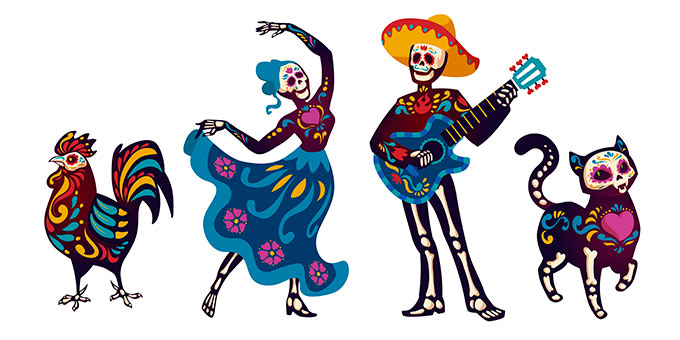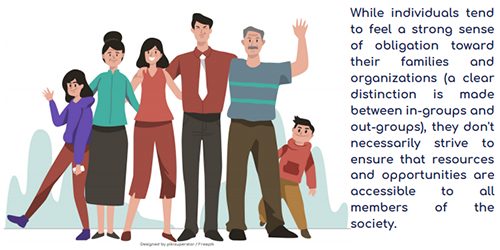The Concepts of Happiness and Well-Being Across Cultures
"Happiness is dependent on unhappiness, while unhappiness is hidden in happiness."
- Chinese proverb -***
What ideas, thoughts, and feelings do you associate with the word "happiness"? Have you ever considered the possibility that the definition of happiness might depend on one's cultural background?
Today we're going back to the topic of individualistic vs collectivist values to discuss and analyze the findings of different studies on the influence of culture on SWB (Subjective Well Being), a concept defined as "a person's cognitive and affective evaluations of his or her life" (Diener, Lucas, & Oshi, 2002) that includes three core components:
- frequent positive emotional experiences;
- infrequent negative emotional experiences;
- cognitive evaluations of one's life satisfaction.
According to a study on Subjective Well-Being Across Cultures:
1. "Individualist cultures are happier than collectivists".
As explained in a previous post on the differences between individualistic and collectivist cultures, in individualistic societies (typical of the Anglo-American, the Nordic, and the Germanic Europe cluster) the focus is on personal priorities and self-realization: people value freedom and individual achievements, independence and self-reliance are important, self-concepts are based on personal traits rather than social roles ("I am kind" vs "I am a good son" typical of collectivist societies).

In collectivist societies, on the other hand, the collective interest is more important than individual pursuits: the focus is on preserving harmony and respecting hierarchy within the community, selflessness and conformity are highly valued, personal achievements are likely to be portrayed as a result of external factors rather than personal merit.

To explain the high SWB of individualistic cultures, the study suggests two main possibilities:
- "when it comes to happiness, it might be more critical to have a high sense of personal choice and freedom than to have a reliable social safety net during difficult times. After all, bad life events happen only occasionally, whereas personal goals constantly affect the quality of daily experience.";
- "the desire to be happy might be stronger in individualist than in collectivist cultures. In individualist cultures where much personal freedom and opportunities are available, each person is highly accountable for his happiness. Being unhappy, in such a cultural context, is indirectly admitting that one has not been able to make the most out of his life opportunities, talents, and capabilities. In many collectivist East Asian cultures, on the other hand, people are believed to have only limited control over happiness. Because the responsibility to be happy is more squarely on the person's shoulder in individualist than in collectivist cultures, it is possible that people try harder to be happy in the former culture".
[On a related note, I would like to mention a study conducted for Stanford University in 1999: 29 Asian and 27 European-American citizens recruited at the San Francisco International Airport were asked to fill in a short questionnaire, and told that afterwards they would receive a pen as a gift. The pens used for the experiment, of the same design and quality, were selected in two different colour — green and orange — and presented in a group of five characterized by a colour imbalance: either a one-four or a two-three ratio. The findings reported that regardless of the scenario, Asian citizens picked a pen of the more common colour more frequently than their European-American counterparts (75% v 25% ratio), proving the theory that participants to the study chose their prize according to their own (unconscious) cultural values. As stated by researchers Kim and Markus, "Uniqueness has positive connotations of freedom and independence in American culture, whereas conformity has positive connotations of connectedness and harmony in East Asian culture". The study concluded that while choosing the more uncommon colour seemed to point toward "an expression of individual preference," the 75% of European-American participants making the same choice indicated that a "preference for uniqueness was the norm". On the other hand, by choosing the pen that did not stand out among the group (the "non-deviant" element), Asian participants showed both their preference for conformity and a high level of concern and consideration for the other members of the group who might have preferred the "unique" item.]
2. Psychological attributes characterizing the self (e.g., self-esteem, self-consistency) are more relevant to the happiness of Western individualists than to the happiness of collectivists".
With regard to this point, the research speculates that "people living in individualistic cultures might find it easier to ‘think' they are happier than people in collectivist cultures", as in individualistic cultures "people are freely allowed to base their happiness on domains/experiences they feel particularly good about", while in collectivist cultures "the types of achievements that are worthy of personal happiness are more often decided by the ingroup or the society, rather than by each individual".
3. "The self-judgment of happiness is anchored on different types of cues and experiences across cultures".
Concerning this last finding, the study proposes that "the more individualist the nation, the more strongly were the life satisfaction judgments based on internal emotions. Basically, individualist cultural members seemed to adopt the logic that ‘if I am feeling good these days, it must mean my overall life is quite satisfying.", while "collectivist cultural members tend to pay considerable amount of attention to social cues (e.g., whether significant others approve the way they live) during their life satisfaction judgments".
With regard to the cultural correlates of happiness, a different paper on the cultural psychological study of SWB explains that while "the individual-oriented Euro-American cultural conception of SWB is composed of two distinct characteristics: personal accountability and explicit pursuit", "the social-oriented East Asian cultural conception of SWB is composed of two distinct characteristics: role obligations and dialectical balance" (dialectical balance intended as a relationship of interdependence between happiness and unhappiness, with each entity depending "on the other for contrast and meaning").
It's also worth noting that to the question "What is happiness?", the Chinese students who contributed to the study defined happiness as "(a) a mental state of satisfaction and contentment; (b) positive feelings/emotions; (c) a harmonious homeostasis; (d) achievement and hope; and (e) freedom from ill-being", while for Caucasian-American students happiness is a concept associated with "(a) a mental state of satisfaction and contentment; (b) positive feelings/emotions; (c) achievement and control; (d) self-autonomy; (e) freedom from ill-being; (f) relating to people; and (g) the ultimate value in life" (to better understand the importance of maintaining harmony and balance with the external world - harmonious homeostatis - for Asian students, please check the post on holistic vs analytical thinking).
Finally, concerning SWB in a different kind of collectivist environment (Latin America), it is interesting to note that even though research indicates income as a strong predictor of happiness/SWB in developing economies (Veenhoven, 1991), Latin American countries appear to have a higher happiness index than their GDP would predict.
According to Mariano Rojas, Professor of economics at the Latin American Faculty of Social Science-Mexico City and at the Universidad Popular Autónoma del Estado de Puebla (Mexico), the high happiness situation in Latin America can be attributed to "the abundance and relevance of close and warm interpersonal relations in the region".

- Día de los Muertos (related article available at this link) -
In his analysis Professor Rojas does also explain that culture in Latin America "can be characterized by: the focus on the nurturing of warm and close interpersonal relations with relatives and friends, the centrality of the family – both nuclear and extended – an affective regime that values and encourages the experience and manifestation of emotions, the existence of relatively weak civic relationships (those relations beyond family, friends, neighbors, and colleagues), a relative disregard for materialistic values, and weak political institutions".
For additional context on this last paragraph, please note that:
A) A peculiarity of the Latin America cluster is that it scores high in In-Group Collectivism, and relatively low on Institutional Collectivism ("the centrality of the family – both nuclear and extended" vs "the existence of relatively weak civic relationships");

B) "Weak political institutions": Latin American cultures are honor-shame cultures. As highlighted in a previous post, "honor cultures developed in regions with herding economies and low population density. In environments where poaching posed a concrete threat to one's wealth, and in the absence of a strong central authority that could offer protection and support to citizens, individuals were expected to protect themselves, their families, and their belongings".
***
To be notified about the upcoming posts, please consider subscribing to Mudita's newsletter.
***
Sources:
- Diener, E., Lucas, R. E., & Oishi, S. (2002). "Subjective well-being: The science of happiness and life satisfaction". In C. R. Snyder & S. J. Lopez (Eds.), Handbook of positive psychology (pp. 63–73). New York: Oxford University Press.
- Suh, Eunkook & Oishi, Shigehiro. (2002). "Subjective Well-Being Across Cultures". Online Readings in Psychology and Culture. 10(1). https://doi.org/10.9707/2307-0919.1076
- Kim, H., & Markus, H. R. (1999). "Deviance or uniqueness, harmony or conformity? A cultural analysis". Journal of Personality and Social Psychology, 77(4), 785–800. https://doi.org/10.1037/0022-3514.77.4.785
- Lu, L. (2005). "In Pursuit of Happiness: The Cultural Psychological Study of SWB". Chinese Journal of Psychology, 47(2), 99–112
- Veenhoven, R. (1991). Is happiness relative? Social Indicators Research, 24(1), 1–34. https://doi.org/10.1007/BF00292648
- Rojas, Mariano. (2018). "Latin American Happiness has Social Foundations", chapter 6. World Happiness Report 2018.
- Hofstede, Geert H. (1997). "Cultures and Organizations: Software of the Mind". New York: McGraw-Hill
- House, R. J., Hanges, P. J., Javidan, M., Dorfman, P. W., & Gupta, V. (2004). "Culture, leadership, and organizations: The GLOBE study of 62 societies". CA: Thousand Oaks
Disclosure: This post contains affiliate links. If you were to buy any of the books recommended here, I would earn a small commission (at no additional cost to you).

